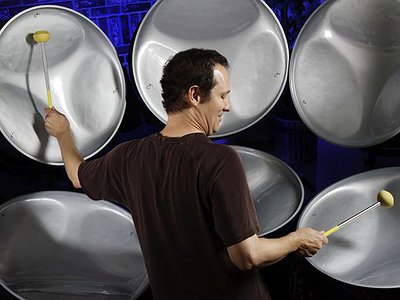When did you start composing film music - and what or who were your early passions and influences?
I was a rock and roll drummer for many years. I performed and recorded with The Weirdos, The Dickies, Lydia Lunch, The Red Hot Chilli Peppers, and my all-time favourite musical hero, Captain Beefheart. I became fascinated by music technology in the late 80's and in part, that is what led me out of rock and roll and into film scoring.
My first scoring job was an episode of Pee Wee's Playhouse and I remember thinking how writing to a picture created unique musical structures and allowed for more originality and diversity than the music I was hearing in clubs and on the radio.
What do you personally consider to be incisive moments in your work and/or career?
The big turning points are usually the times when you try to do something outside your comfort zone. Joining my first punk-rock band, The Weirdos was one moment, Captain Beefheart was another and the Red Hot Chili Peppers was yet another. Then trying to take my rock and roll skills into the realm of film scoring was probably the biggest gear-shift in my career ... and I'm still working on that.
What are currently your main compositional challenges?
When you take something that you love doing and turn it into a career, it's easy to lose sight of the feeling you had when it was something that you once did just for fun. Writing music may be one of the best jobs in the world but when it turns into a 70 hour-a-week job with deadline pressures and people yelling at you, it's easy to curl up into the fetal position, burst into tears and feel like you're just another numbskull in the rat race. Keeping everything fresh, new and enjoyable is always my biggest challenge.
As a soundtrack composer, one must usually adapt one's ideas to the film, the director and the audience. How does one maintain a balance between, on the one hand, artistic integrity and sticking to one's creative convictions and, on the other, being professional in one's job? How does one find a sense of freedom within these structures?
I always place professional conduct ahead of being an uncompromising idealist. Nobody wants to work with a pain-in-the-ass composer. Usually, I am encouraged to score a film in my own personal voice, so I can generally hit my quota of integrity without breaking too much of a sweat. Ideally, the film comes first. Me, the director, the audience and everybody else all have to get in line behind the needs of the film, in my opinion. Of course, when there's a disagreement over what those needs are, the director usually wins.
What do you usually start with when composing? At which stage of the movie production process do you prefer to get involved?
The process usually starts with watching the movie. The next step is laying on the couch and staring at the ceiling for a while. Then I talk to the director and ask a lot of questions. Eventually, I get around to sitting down in front of the keyboard and trying to make myself useful. Typically, I'll sketch out a couple of bad ideas before I write anything that's any good and when I do, I'm all set. A little goes a long way in film music, particularly with my style.
What do improvisation and composition mean to you and what, to you, are their respective merits?
I usually look for an inspired accident to kick off the proceedings…something unusual and not planned generally makes for the best foundation. Then I apply a more premeditated process to sculpt, refine, develop and turn that accident into something that will hopefully become an interesting composition. Of course, you can't make lightening strike if it doesn't want to and there's only so much time you can spend waiting around for it. That's when composing skills take over. Composing is much more reliable than improvising ... for me at least.
Over the decades, film music as a whole, despite the radical differences depending on genre or style, has developed a certain tradition and vocabulary or tools, techniques and thematic development. How would you describe your relationship with this tradition and what roles does it play in your work?
I'm an electronic musician who occasionally wanders off the reservation and creates orchestral or orchestral/electronic hybrid scores. So I'm not really steeped in the European symphonic tradition that most people consider to be the foundation of film music. However, there is not much in the history of North American music that hasn't been influenced by European art music. I don't spend much time sitting around trying to sound like Bach but I'm sure I've got some of his musical DNA floating around in there with some of mine somewhere.



